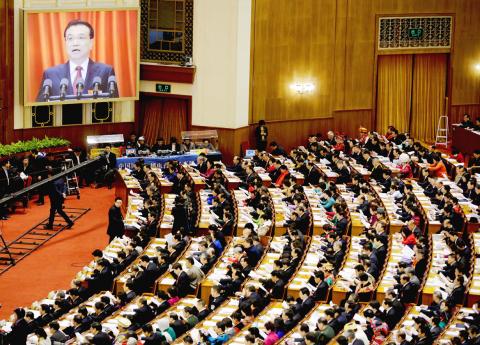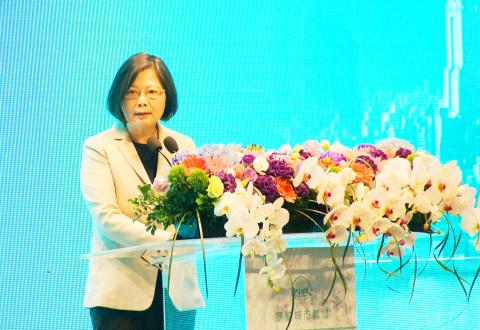Politicians in Taiwan backed the “status quo” yesterday after Beijing stepped up its rhetoric against Taiwanese independence, with Chinese Premier Li Keqiang (李克強) warning against “separatist activities” and pledging to safeguard China’s “territorial integrity.”
The Democratic Progressive Party (DPP) played down Li’s remarks that a peaceful and stable relationship across the Taiwan Strait should be developed under the so-called “1992 consensus” and that both sides are “part of one big family.”
“The DPP’s cross-strait policy is to maintain the status quo as president-elect Tsai [Ing-wen, 蔡英文] proposed,” DPP spokesperson Wang Min-sheng (王閔生) said.

Photo: AP
“This is not only in line with mainstream public opinion in Taiwan, but would also maintain regional stability,” Wang said.
Wang said that Tsai’s definition of the “status quo” relates to the democratic and free state of Taiwan and the peaceful relationship across the Taiwan Strait.
The Mainland Affairs Council said the government’s “mainland policy” is to maintain the “status quo” of “no unification, no independence and no armed conflict” across the Taiwan Strait, while pushing for peaceful and stable developments based on the “1992 consensus.”

Photo: CNA
The council said that the “mainland policy” should be created in line with the framework of the Republic of China (ROC) Constitution.
New Power Party Legislator Freddy Lim (林昶佐) said he “is not particularly surprised” by China’s warning, adding that there is no need to “overreact” to new references to China’s resolve to oppose Taiwanese independence.
“They are always reiterating their stance and I think we should just treat it calmly to try to normalize it,” Lim said.
“After all, China is just one country,” he said, downplaying Li’s referring to both sides of the strait as a “family.”
Cross-strait “interaction and communication does not rely upon whether we are of the same so-called ‘family’ — we do not engage in dialogue with Japan and the US because they are closer ‘family,’” he said.
Li said at the opening of the Chinese National People’s Congress that Beijing plans to “oppose separatist activities for the independence of Taiwan” and “safeguard China’s sovereignty and territorial integrity.”
Both clauses were additions to remarks he made on the issue at last year’s National People’s Congress.
Beijing has repeatedly asserted its belief in the “1992 consensus,” a term former council chairman Su Chi (蘇起) admitted making up in 2000, which refers to a tacit understanding between the Chinese Nationalist Party (KMT) and the Chinese government that both sides of the Taiwan Strait acknowledge there is “one China,” with each side having its own interpretation of what “China” means.
Li spoke of people on both sides of the Taiwan Strait as “fellow compatriots” belonging to “one and the same family,” sharing a “common destiny.”
The phrasing echoed Chinese President Xi Jinping’s (習近平) rhetoric from November last year, when President Ma Ying-jeou (馬英九) and the Chinese leader reached across decades of Cold War-era estrangement and rivalry to exchange a historic handshake in the first summit since 1949.
“We are brothers connected by flesh, even if our bones are broken,” Xi said then. “We are a family whose blood is thicker than water.”

GEARING UP: An invasion would be difficult and would strain China’s forces, but it has conducted large-scale training supporting an invasion scenario, the report said China increased its military pressure on Taiwan last year and took other steps in preparation for a potential invasion, an annual report published by the US Department of Defense on Wednesday showed. “Throughout 2023, Beijing continued to erode longstanding norms in and around Taiwan by employing a range of pressure tactics against Taiwan,” the report said, which is titled “Military and Security Developments Involving the People’s Republic of China (PRC) 2024.” The Chinese People’s Liberation Army (PLA) “is preparing for a contingency to unify Taiwan with the PRC by force, if perceived as necessary by Beijing, while simultaneously deterring, delaying or denying

‘ONE BRIDGE’: The US president-elect met with Akie Abe on Dec. 15 in Florida and the two discussed a potential Taiwan-China conflict’s implications for world peace US president-elect Donald Trump has described Taiwan as “a major issue for world peace” during a meeting with Akie Abe, the widow of late Japanese prime minister Shinzo Abe, Japanese newspaper the Yomiuri Shimbun quoted sources as saying in a report yesterday. Trump met with Akie Abe on Dec. 15 at the Mar-a-Lago estate in Florida, where the two discussed the Russo-Ukrainian war and the situation in the Taiwan Strait. During the meeting, Trump spoke on the implications for world peace of a potential Taiwan-China conflict, which “indicated his administration’s stance of placing importance on dealing with the situation in

QUICK LOOK: The amendments include stricter recall requirements and Constitutional Court procedures, as well as a big increase in local governments’ budgets Portions of controversial amendments to tighten requirements for recalling officials and Constitutional Court procedures were passed by opposition lawmakers yesterday following clashes between lawmakers in the morning, as Democratic Progressive Party (DPP) members tried to block Chinese Nationalist Party (KMT) legislators from entering the chamber. Parts of the Public Officials Election and Recall Act (公職人員選舉罷免法) and Constitutional Court Procedure Act (憲法訴訟法) passed the third reading yesterday. The legislature was still voting on various amendments to the Act Governing the Allocation of Government Revenues and Expenditures (財政收支劃分法) as of press time last night, after the session was extended to midnight. Amendments to Article 4

ALLIANCE: Washington continues to implement its policy of normalizing arms sales to Taiwan and helps enhance its defense, the Ministry of Foreign Affairs said US President Joe Biden on Friday agreed to provide US$571.3 million in defense support for Taiwan, the White House said, while the US State Department approved the potential sale of US$265 million in military equipment. Biden had delegated to the secretary of state the authority “to direct the drawdown of up to US$571.3 million in defense articles and services of the Department of Defense, and military education and training, to provide assistance to Taiwan,” the White House said in a statement. However, it did not provide specific details about this latest package, which was the third of its kind to